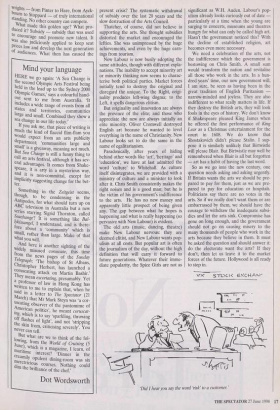Mind your language
HERE we go again: 'A Sea Change is the second Olympic Arts Festival being held in the lead up to the Sydney 2000 Olympic Games,' says a colourful hand- out sent to me from Australia. 'It includes a wide range of events from all states and territories, communities large and small. Combined they show a sea change in our life today.' If you ask me, that piece of writing is much the kind of flaccid flim-flam you would expect from an arts publicity department; 'communities large and small' is a giveaway, meaning not much. But Sea Change is still a funny thing to call an arts festival, although it has sev- eral advantages. It comes from Shake- speare, it is arty in a mysterious way, and it is non-committal, except for implicitly suggesting change for the bet- ter.
Something in the Zeitgeist seems, though, to be condensing in the Antipodes, for what should turn up on ABC television in Australia but a new series starring Sigrid Thornton, called Seachange? It is something like Bal- lykissangel, I understand, and is there- fore about a 'community' which is small, rather than large. Make of that what you will.
And here is another sighting of the widely misused coruscate, this time from the news pages of the Sunday Telegraph: 'The bishop of St Albans, Christopher Herbert, has launched a coruscating attack on Martin Bashir.' They mean excoriating, presumably. Yet a professor of law in Hong Kong has written to me to explain that, when he said in a letter to The Spectator (21 March) that Mr Mark Steyn was 'a cor- uscating observer of the pantomime of American politics', he meant coruscat- ing, which is to say 'sparkling, throwing off flashes of light', and not 'stripping the skin from, criticising severely'. You never can tell. But what are we to think of the fol- lowing, from the World of Cruising (5 June), which is a magazine, I learn, of maritime interest? 'Dinner in the creamily opulent dining-room was six meretricious courses. Nothing could dim the brilliance of the chef.'
Dot Wordsworth


























































 Previous page
Previous page